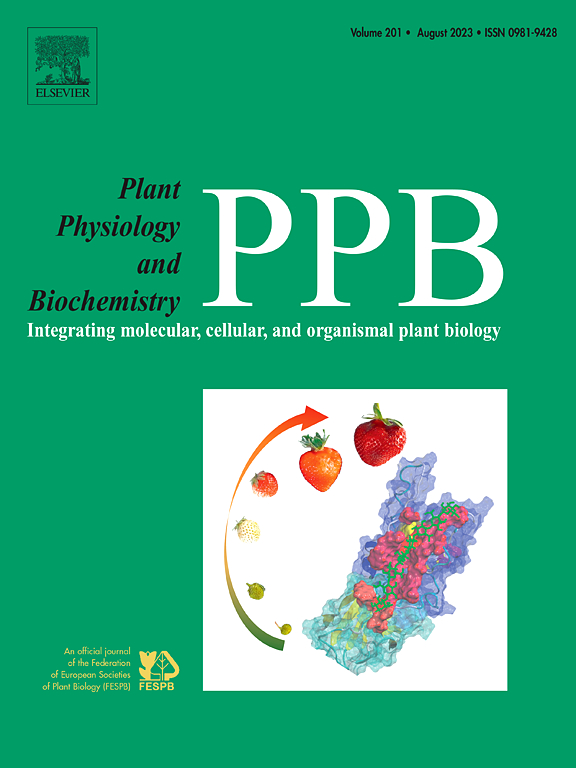SlMKK4 负责番茄的花粉发育
IF 6.1
2区 生物学
Q1 PLANT SCIENCES
引用次数: 0
摘要
有活力花粉的发育是雄性繁殖力的决定因素,在被子植物的繁殖过程中起着至关重要的作用。丝裂原活化蛋白激酶(MAPK)级联调节植物生长的多个方面,但它们在减数分裂后花粉发育中的参与还不清楚。本研究发现,SlMKK4 是监督番茄(Solanum lycopersicum)花粉发育的关键调节因子。利用 CRISPR 相关蛋白 9 破坏 SlMKK4 会导致花粉活力明显下降。细胞生物学和转录组分析结果表明,SlMKK4 在减数分裂后的花粉发育过程中专门调节辅助素和糖代谢以及信号转导。蛋白-蛋白相互作用分析和体外磷酸化分析表明,SlMKK4 是 SlMPK20 的上游 MAPKK,而 SlMPK20 在西红柿小孢子发生过程中具有调节无核(UN)到双核(BN)转变的独特功能。此外,转基因植株的花粉主要在 BN 阶段出现明显停滞,并在 UN 小孢子晚期出现亚细胞异常。此外,转录组分析表明,SlMKK4 基因敲除显著下调了花药中调节辅酶和糖代谢以及信号转导的许多基因的表达。因此,我们的研究结果表明,SlMKK4可能是SlMPK20的上游SlMAPKK之一,并在调控番茄植物减数分裂后花粉发育过程中发挥着关键作用。本文章由计算机程序翻译,如有差异,请以英文原文为准。
SlMKK4 is responsible for pollen development in tomato
The development of viable pollen is a determinant of male fertility and plays an essential role in the reproductive process of angiosperms. Mitogen-activated protein kinase (MAPK) cascades modulate diverse aspects of plant growth, but their involvement in post-meiotic pollen development is unclear. In this study, SlMKK4 was identified as a crucial regulator in overseeing pollen development in tomatoes (Solanum lycopersicum). Utilizing CRISPR-associated protein 9 to disrupt SlMKK4 resulted in an obvious decrease in pollen viability. The results of cell biology and transcriptomic analyses demonstrated that SlMKK4 specifically regulates auxin and sugar metabolism as well as signal transduction during post-meiotic pollen development. This is supported by the finding that protein–protein interaction assays and in vitro phosphorylation assays indicate that SlMKK4 serves as the upstream MAPKK for SlMPK20, which exhibits a distinct function in regulating the uninucleate (UN) to binucleate (BN) transition during microgametogenesis in tomatoes. Moreover, pollen from transgenic plants experienced significant arrest predominantly at the BN stage, accompanied by subcellular abnormalities manifesting during the late UN microspore phase. Furthermore, transcriptomic analyses indicated that SlMKK4 knockout remarkably downregulated the expression of numerous genes regulating auxin and sugar metabolism as well as signal transduction in anthers. Therefore, our findings suggest that SlMKK4 may serve as one of the upstream SlMAPKKs of SlMPK20 and also play a pivotal role in modulating post-meiotic pollen development in tomato plants.
求助全文
通过发布文献求助,成功后即可免费获取论文全文。
去求助
来源期刊
CiteScore
11.10
自引率
3.10%
发文量
410
审稿时长
33 days
期刊介绍:
Plant Physiology and Biochemistry publishes original theoretical, experimental and technical contributions in the various fields of plant physiology (biochemistry, physiology, structure, genetics, plant-microbe interactions, etc.) at diverse levels of integration (molecular, subcellular, cellular, organ, whole plant, environmental). Opinions expressed in the journal are the sole responsibility of the authors and publication does not imply the editors'' agreement.
Manuscripts describing molecular-genetic and/or gene expression data that are not integrated with biochemical analysis and/or actual measurements of plant physiological processes are not suitable for PPB. Also "Omics" studies (transcriptomics, proteomics, metabolomics, etc.) reporting descriptive analysis without an element of functional validation assays, will not be considered. Similarly, applied agronomic or phytochemical studies that generate no new, fundamental insights in plant physiological and/or biochemical processes are not suitable for publication in PPB.
Plant Physiology and Biochemistry publishes several types of articles: Reviews, Papers and Short Papers. Articles for Reviews are either invited by the editor or proposed by the authors for the editor''s prior agreement. Reviews should not exceed 40 typewritten pages and Short Papers no more than approximately 8 typewritten pages. The fundamental character of Plant Physiology and Biochemistry remains that of a journal for original results.

 求助内容:
求助内容: 应助结果提醒方式:
应助结果提醒方式:


